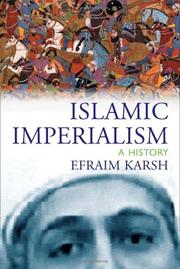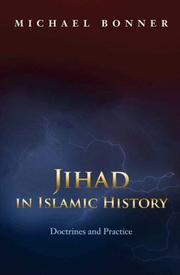| Listing 1 - 10 of 145 | << page >> |
Sort by
|
Book
ISBN: 1108265669 110827112X 1108241700 1108416683 1108404057 Year: 2017 Publisher: Cambridge : Cambridge University Press,
Abstract | Keywords | Export | Availability | Bookmark
 Loading...
Loading...Choose an application
- Reference Manager
- EndNote
- RefWorks (Direct export to RefWorks)
Deadly Clerics explains why some Muslim clerics adopt the ideology of militant jihadism while most do not. The book explores multiple pathways of cleric radicalization and shows that the interplay of academic, religious, and political institutions has influenced the rise of modern jihadism through a mechanism of blocked ambition. As long as clerics' academic ambitions remain attainable, they are unlikely to espouse violent jihad. Clerics who are forced out of academia are more likely to turn to jihad for two reasons: jihadist ideas are attractive to those who see the system as turning against them, and preaching a jihad ideology can help these outsider clerics attract supporters and funds. The book draws on evidence from various sources, including large-scale statistical analysis of texts and network data obtained from the Internet, case studies of clerics' lives, and ethnographic participant observations at sites in Cairo, Egypt.
Jihad. --- Holy war (Islam) --- Islamic holy war --- Jahad --- Jehad --- Muslim holy war --- War (Islamic law)
Book
ISBN: 9780231550499 0231550499 9780231193764 9780231193771 Year: 2020 Publisher: New York, NY
Abstract | Keywords | Export | Availability | Bookmark
 Loading...
Loading...Choose an application
- Reference Manager
- EndNote
- RefWorks (Direct export to RefWorks)
Tunisia became one of the largest sources of foreign fighters for the Islamic State—even though the country stands out as a democratic bright spot of the Arab uprisings and despite the fact that it had very little history of terrorist violence within its borders prior to 2011. In Your Sons Are at Your Service, Aaron Y. Zelin uncovers the longer history of Tunisian involvement in the jihadi movement and offers an in-depth examination of the reasons why so many Tunisians became drawn to jihadism following the 2011 revolution.Zelin highlights the longer-term causes that affected jihadi recruitment in Tunisia, including the prior history of Tunisians joining jihadi organizations and playing key roles in far-flung parts of the world over the past four decades. He contends that the jihadi group Ansar al-Sharia in Tunisia was able to take advantage of the universal prisoner amnesty, increased openness, and the lack of governmental policy toward it after the revolution. In turn, this provided space for greater recruitment and subsequent mobilization to fight abroad once the Tunisian government cracked down on the group in 2013. Zelin marshals cutting-edge empirical findings, extensive primary source research, and on-the-ground fieldwork, including a variety of documents in Arabic going as far back as the 1980s and interviews with Ansar al-Sharia members and Tunisian fighters returning from Syria. The first book on the history of the Tunisian jihadi movement, Your Sons Are at Your Service is a meticulously researched account that challenges simplified views of jihadism’s appeal and success.
Jihad --- Holy war (Islam) --- Islamic holy war --- Jahad --- Jehad --- Muslim holy war --- War (Islamic law) --- Jihad.
Book
ISBN: 3110675277 9783110675276 9783879977277 Year: 2020 Publisher: Berlin Boston
Abstract | Keywords | Export | Availability | Bookmark
 Loading...
Loading...Choose an application
- Reference Manager
- EndNote
- RefWorks (Direct export to RefWorks)
This book addresses the Jihad movement that created the largest African state of the 19th century: the Sokoto Caliphate, existing for 99 years from 1804 until its military defeat by European colonial troops in 1903. The author carves out the entanglements of jihadist ideology and warfare with geographical concepts at Africa's periphery of the Islamic world: geographical knowledge about the boundary between the "Land of Islam" and the "Land of War"; the pre-colonial construction of "the Muslim" and "the unbeliever"; and the transfer of ideas between political elites and mobile actors (traders, pilgrims, slaves, soldiers), whose reports helped shape new definitions of the African frontier of Islam. Research for this book is based on the study of a very wide range of Arabic and West African (Hausa, Fulfulde) manuscripts. Their policies reveal the persistent reciprocity of jihadist warfare and territorial statehood, of Africa and the Middle East. This book addresses the Jihad movement that created the largest African state of the 19th century: the Sokoto Caliphate, existing for 99 years from 1804 until its military defeat by European colonial troops in 1903. The author carves out the entanglements of jihadist ideology and warfare with geographical concepts at Africa's periphery of the Islamic world: geographical knowledge about the boundary between the "Land of Islam" and the "Land of War"; the pre-colonial construction of "the Muslim" and "the unbeliever"; and the transfer of ideas between political elites and mobile actors (traders, pilgrims, slaves, soldiers), whose reports helped shape new definitions of the African frontier of Islam. Research for this book is based on the study of a very wide range of Arabic and West African (Hausa, Fulfulde) manuscripts. Their policies reveal the persistent reciprocity of jihadist warfare and territorial statehood, of Africa and the Middle East. Stephanie Zehnle is Assistant Professor (JProf) of Extra-European History at Kiel University (Christian-Albrechts-Universität). Her work on African and trans-continental history includes research on the history of Islam, human-animal relations, and comics in Africa.
Jihad --- Holy war (Islam) --- Islamic holy war --- Jahad --- Jehad --- Muslim holy war --- War (Islamic law) --- History
Book
ISBN: 3737009384 3847009389 3847109383 Year: 2019 Publisher: Vandenhoeck & Ruprecht
Abstract | Keywords | Export | Availability | Bookmark
 Loading...
Loading...Choose an application
- Reference Manager
- EndNote
- RefWorks (Direct export to RefWorks)
The contributions of this volume aim at a new, evidence based approach to Jihadism studies. What is the structure of Jihadi online communication and the dissemination of operational material online? Which errors were made by conventional Jihadism research? Which programs, apps, etc. use Jihadis to further their online communication? Next to these questions the contributors discuss the evident inability to understand basic mathematical principles in conventional Jihadism research and consider a very important video as a case study of Jihadi online communication, stressing the linguistic and theological shortcomings of conventional research. The volume is based on the understanding of theological elements as a vital part of Jihadi communication.
Jihad --- Social aspects. --- Holy war (Islam) --- Islamic holy war --- Jahad --- Jehad --- Muslim holy war --- War (Islamic law) --- Religion --- Islam --- General

ISBN: 0300106033 9780300106039 Year: 2006 Publisher: New Haven ; London Yale University Press
Abstract | Keywords | Export | Availability | Bookmark
 Loading...
Loading...Choose an application
- Reference Manager
- EndNote
- RefWorks (Direct export to RefWorks)
Djihad --- Guerre sainte (Islam) --- Heilige oorlog (Islam) --- Holy war (Islam) --- Islamic holy war --- Jahad --- Jehad --- Jihad --- Muslim holy war --- Imperialism --- Islam --- Jihad. --- History. --- Islamic Empire --- History

ISBN: 0691125740 9780691125749 0691138389 1400827388 1282086871 9786612086878 Year: 2006 Publisher: Princeton ; Oxford Princeton University Press
Abstract | Keywords | Export | Availability | Bookmark
 Loading...
Loading...Choose an application
- Reference Manager
- EndNote
- RefWorks (Direct export to RefWorks)
What is jihad? Does it mean violence, as many non-Muslims assume? Or does it mean peace, as some Muslims insist? Because jihad is closely associated with the early spread of Islam, today's debate about the origin and meaning of jihad is nothing less than a struggle over Islam itself. In Jihad in Islamic History, Michael Bonner provides the first study in English that focuses on the early history of jihad, shedding much-needed light on the most recent controversies over jihad. To some, jihad is the essence of radical Islamist ideology, a synonym for terrorism, and even proof of Islam's innate violence. To others, jihad means a peaceful, individual, and internal spiritual striving. Bonner, however, shows that those who argue that jihad means only violence or only peace are both wrong. Jihad is a complex set of doctrines and practices that have changed over time and continue to evolve today. The Quran's messages about fighting and jihad are inseparable from its requirements of generosity and care for the poor. Jihad has often been a constructive and creative force, the key to building new Islamic societies and states. Jihad has regulated relations between Muslims and non-Muslims, in peace as well as in war. And while today's "jihadists" are in some ways following the "classical" jihad tradition, they have in other ways completely broken with it. Written for general readers who want to understand jihad and its controversies, Jihad in Islamic History will also interest specialists because of its original arguments.
Jihad --- War --- History. --- Religious aspects --- Islam. --- Holy war (Islam) --- Islamic holy war --- Jahad --- Jehad --- Muslim holy war --- War (Islamic law) --- War and Islam
Book
ISBN: 9780804139540 Year: 2016 Publisher: New York Crown Publishers
Abstract | Keywords | Export | Availability | Bookmark
 Loading...
Loading...Choose an application
- Reference Manager
- EndNote
- RefWorks (Direct export to RefWorks)
This book presents a look at 'homegrown' Islamist terrorism, from 9/11 to the present, discusses the perpetrators who have acted both in the U.S. and abroad, and examines the controversial tactics used to track potential terrorists.
Djihad --- Guerre sainte (Islam) --- Heilige oorlog (Islam) --- Holy war (Islam) --- Islamic holy war --- Jahad --- Jehad --- Jihad --- Muslim holy war --- Terrorism --- United States --- Religious aspects --- Islam --- Terrorists --- Recruiting
Book
ISBN: 0585368651 9780585368658 9004669515 Year: 1977 Volume: v. 5 Publisher: Leyden Brill
Abstract | Keywords | Export | Availability | Bookmark
 Loading...
Loading...Choose an application
- Reference Manager
- EndNote
- RefWorks (Direct export to RefWorks)
Jihad. --- War --- Islam --- Religion --- Philosophy & Religion --- War and Islam --- Holy war (Islam) --- Islamic holy war --- Jahad --- Jehad --- Muslim holy war --- War (Islamic law) --- Religious aspects --- Islam.
Book
ISBN: 1283260026 9786613260024 9048521602 9789048521609 9789052603292 9052603294 Year: 2009 Publisher: Amsterdam Aksant
Abstract | Keywords | Export | Availability | Bookmark
 Loading...
Loading...Choose an application
- Reference Manager
- EndNote
- RefWorks (Direct export to RefWorks)
Geweld in naam van de islam vormt voor westerse samenlevingen een bedreiging, getuige de aanslagen in New York, Madrid en Londen. In Nederland heeft de moord op Theo van Gogh voor een toenemende aandacht voor radicale Nederlandse moslims gezorgd die zich afzetten tegen de Nederlandse samenleving en specifiek voor de enkelingen die daarin zelfs een gewelddadige koers propageren. Om preventief beleid te kunnen ontwikkelen is het van belang te weten waarom deze jongeren kiezen voor een radicale invulling van de islam, een benadering die de meeste moslims met argusogen bekijken.Deze uitgave geeft
Islam --- Salafīyah. --- Jihad. --- Holy war (Islam) --- Islamic holy war --- Jahad --- Jehad --- Muslim holy war --- War (Islamic law) --- Salafiyya --- Islamic sects --- Nederland --- Salafiyah.
Book
ISBN: 9781597975285 Year: 2011 Publisher: Washington, D.C. Potomac Books
Abstract | Keywords | Export | Availability | Bookmark
 Loading...
Loading...Choose an application
- Reference Manager
- EndNote
- RefWorks (Direct export to RefWorks)
Polemology --- Jihad --- Nuclear terrorism --- 854 Terrorisme --- 872 Massavernietigingswapens --- Terrorism --- Holy war (Islam) --- Islamic holy war --- Jahad --- Jehad --- Muslim holy war --- War (Islamic law) --- Prevention
| Listing 1 - 10 of 145 | << page >> |
Sort by
|

 Search
Search Feedback
Feedback About UniCat
About UniCat  Help
Help News
News